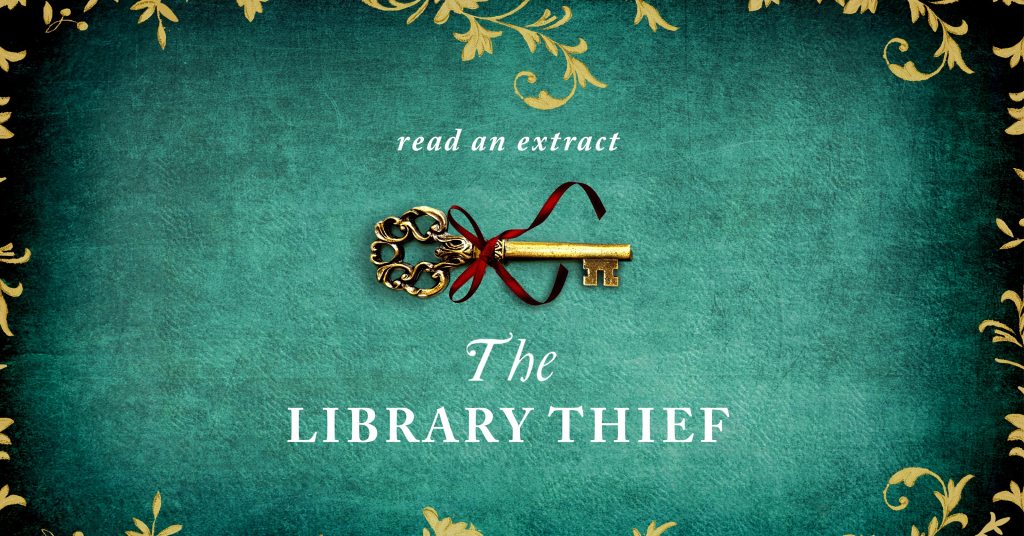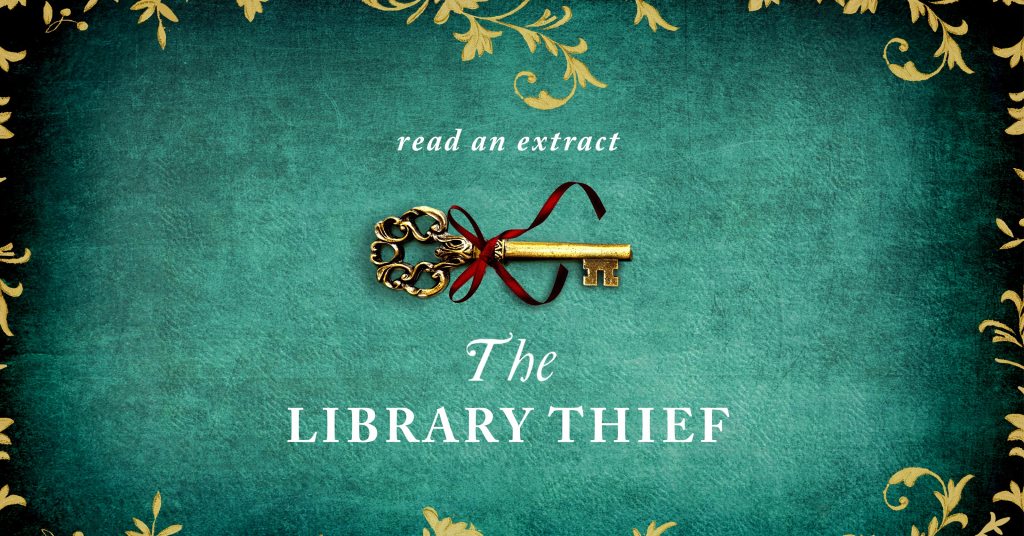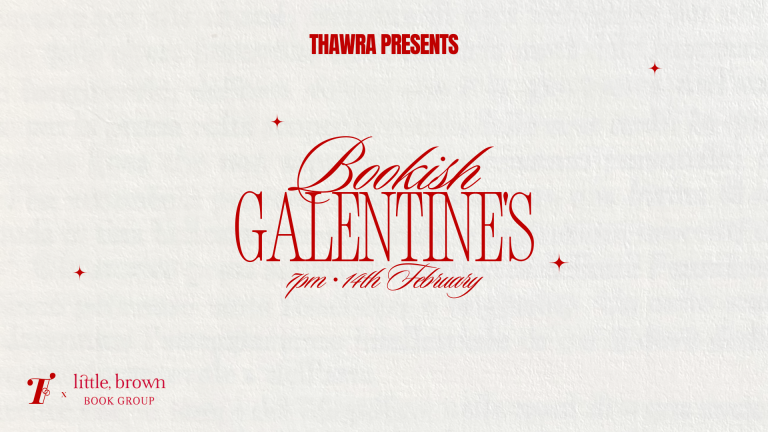Read an extract from The Library Thief by Kuchenga Shenjé


The library is under lock and key. But its secrets can’t be contained.
After he brought her home from Jamaica as a baby, Florence’s father had her hair hot-combed to make her look like the other girls. But as a young woman, Florence is not so easy to tame – and when she brings scandal to his door, the bookbinder throws her onto the streets of Manchester.
Intercepting her father’s latest commission, Florence talks her way into the remote, forbidding Rose Hall to restore its collection of rare books. Lord Francis Belfield’s library is old and full of secrets – but none so intriguing as the whispers about his late wife.
Then one night, the library is broken into. Strangely, all the priceless tomes remain untouched. Florence is puzzled, until she discovers a half-burned book in the fireplace. She realises with horror that someone has found and set fire to the secret diary of Lord Belfield’s wife – which may hold the clue to her fate . . .
Scroll down to read an extract.
Prologue
The story starts with a scandal that I thought would end my life. Fortunately, my scandal didn’t kill anyone. In fact, it pales in comparison with what I went on to discover at Rose Hall.
Thus far, the way I see it, in any good life you need to die several times to really lead a life worth living. There are little deaths and there are big deaths. My tale has both – and the real tragedy would be if this story were to die with me.
I was lying when I swore I would take this secret to my grave. I had no right to promise that.
Chapter One
I fell in love with the feel of the cotton before I fell in love with the books. Leather felt too masculine and reptilian. Cloth was so much warmer and didn’t slip out of my hands as easily. As a child I played underneath the tables and made toy families from the scraps that fell at my father’s boots.
He would never talk to me about where the cloth we used came from, nor the contents of the books we worked on. There were a lot of things my father wouldn’t tell me, and rather than keeping me ignorant, his silence made me more curious. And fortunately, I was surrounded by the means to nourish that curiosity.
Most of the time we spent together as I grew up was in silence, folding, bevelling and smoothing. I sometimes wished my fingers could be as thick as his; he didn’t grimace when schooling leather and cloth into precise lines under his digital tutelage. I tried to be like my father, but all the books he left lying around gave me opinions.
I arrived at the front door of Rose Hall looking more ragged than I would have liked. My breath was far from fresh, and the hair pins and clips I had used to imprison the frizzier strands had been loosened by the bumps of the rickety carriage. I had been dropped at the top of a tree-lined drive that was at least a quarter mile long, if not more. The December mists obscured my vision, and I could only just make out the shape of a grand house, the likes of which I had only really seen on biscuit tins in the windows of Manchester’s new department store, though I had imagined them as I read Brontë, Austen and Radcliffe. Even with the curls of mist in the air, I could tell this was a very English dwelling. As I approached it my feet slipped and shifted on the gravel, unused to navigating such terrain after only walking on cobbled streets and across wooden floors.
Lord Francis Belfield of Rose Hall had been my father’s long-standing customer. He was the only man I’d ever seen look luxurious without any air of pomposity. The men of Manchester were not known for wearing velvet, so the sheen of his jackets always marked him out as distinguished. It felt completely fitting that Rose Hall was an ode to symmetry and a more tasteful example of the grandiosity of the mid-eighteenth century. It was an early Georgian home of Lancashire sandstone. Even though my father hadn’t mentioned it, the period of the building’s erection and the mercantile success of Lord Francis Belfield were all I needed to know to deduce that the building and its grounds had been purchased with plantation wealth.
I knocked on the forest-green door and left my suitcases on the ground, hoping that looked more elegant than being strained down by the weight of my clothes, books and binding tools. In my pocket, my fingers found the folds of Lord Belfield’s letter. I inhaled, recalling once more the story I had so carefully rehearsed.
The door opened and a pair of prominent blue eyes glared at me through the crack. ‘Well?’
‘Miss Florence Granger for Lord Francis Belfield, please.’
I took in the lines, too many for the face of someone who was still clearly a young man. The hand holding the door open was rough and calloused.
‘He is expecting me,’ I added.
‘No ’e is not.’
I blinked, having not expected resistance this soon.
‘I assure you I arrive here at the request of Lord Belfield himself. I am from Granger’s of Manchester.’
The door widened and there stood a long-limbed boy of no more than twenty. His movements were almost feline. The way he handled the door without effort despite its apparent heaviness was quite a marvel.
‘We are bookbinders. I’ve been sent to care for your master’s collection.’ I retrieved the letter from the pocket of my coat and held it out.
He made no move to take it, but instead chewed his bottom lip, realising there was truth to my words but clearly unconvinced by me. A female tradesperson at the door to Rose Hall was probably not a common occurrence.
‘Young man, I excuse you of your impertinence, but I have been travelling for some hours and would like to rest,’ I told him, trying a sterner approach. ‘Please fetch your master.’
‘’E don’t rise before midday most days anymore. You can wait in the kitchens, if you like.’
Now it was my turn to falter. I had no way of assessing how appropriate this was. Should I be seated in the parlour? If I allowed myself to be taken to the kitchens, was I aligning
myself with the downstairs staff? I was an artisan, not a servant. But a sharp ripple through my stomach made the decision for me.
‘Very well, so long as your offer comes with a cup of tea.’ I sighed and crouched down to pick up my suitcases.
‘No, m’lady. I’ll tek those.’
He ushered me into the reception hall, lifting my bags up to his sides as if they weighed nothing at all. The door chuffed itself closed behind us with a low groan. The darkness of
the perimeter indicated that there was no draught coming through, nor a single sliver of light. A curtain hung to the right of it and the man gave it a sharp tug. It concealed the entrance entirely once pulled across, an odd choice. It gave the sense of being sealed into the house somehow – not being able to see where one could escape.
Stepping into the hall, I was compelled to look up. It was a huge atrium, with dark green textured walls and candles placed at regular intervals which gave the illusion of a warm,
close space. He led me over a black- tiled floor, underneath a vast yet delicate brass chandelier aglow with coppery bulbs. At the back of the hall, under the bifurcated staircase, he opened a hidden door which led down to the kitchen. Before I had reached the bottom the herbaceous and deeply woody smells of the kitchen came wafting up to greet me. It was divine. But when we reached the flagstoned room I saw there was nothing on the stove; I could only imagine that months of cooking in a room with such small windows had baked the scent into the walls.
I was seated at a wooden table facing an array of copper pans and white jugs with the high windows behind me. It was clearly a kitchen intended for many staff, but there was none of the expected bustle. Where was everyone? I shifted uncomfortably as I cast about for something to say, before realising that I didn’t know the young man’s name.
‘What is your name?’
‘Wesley.’
‘Wesley what?’
He gave me a strange look. ‘Bacchus. Wesley Bacchus. I’m the footman.’
He was telling me that as a footman, his surname did not matter. Of course there was no reason that I, as a craftswoman, should know the intricacies of these hierarchies,
but I sat in silence, not wanting to betray myself further by speaking again.
I was grateful when the cook came in some minutes later – from a pantry, I imagined – but she barely looked in my direction, merely banging a pan of water onto the stove. My
stomach growled something fierce when she entered, almost as if my belly knew that I was meeting the person in charge of feeding the house.
I waited for her to acknowledge me, while Wesley continued to look on with a smile playing about his lips. But she only retrieved a mug and a caddy, before placing a steaming tea in front of me with a snort. My shoulders slumped. I hadn’t expected to be treated as a lady, but had hoped for at least some respect. Would my father have received such a poor greeting?
I sipped the tea, grateful for its sweetness and warmth as the cook clattered about with her back to me. As I finished, she returned to the table with a thick slice of ham sandwiched between two slices of bread. There was also a large apple on the plate and in her other hand was a pewter cup of water. She’d clearly heard my stomach. But her face showed no compassion as she laid the blessed offering on the table.
With one last assessing glance at me, Wesley left, and the cook returned to the stove, making it clear she had no intention of speaking to me. I decided I could forget my manners just as she had hers, and devoured the most delicious meal I’d had in weeks. Salty ham on pillowy bread, with a delightfully sour apple and water that tasted like it came from the purest spring to cleanse my palate. After greedily wiping the crumbs
off the plate with one of my fingers, I took out A Christmas Carol from my coat pocket and started reading until the words on the page began to blur. The beast of a carriage I had travelled in overnight had creaked with the strain of being drawn up even the slightest incline. Combined with the cold that jolted me from slumber, I had only been able to sleep in fits and bursts.
I awoke, suddenly, with my head on my crossed arms in front of me and my wrist soaking wet from my dribble. The plate and pewter cup had been taken away and Wesley was standing above me, a mocking smile about his thickish lips.
‘I’m sorry to wake you, Miss. Lord Belfield says he’ll see you now.’
Wesley led me back upstairs, and down a corridor. As we passed a tall, gilded mirror, I stopped, horrified by my reflection. My hair, after only days left to its own devices, was now once again completely untamed. My eyes were bloodshot with fatigue and my skin was pale, making my freckles stand out. Hastily, I tried to force my frizzed hair back beneath its pins as Wesley stopped too. He watched me with amusement until I had done the best I could, and we continued on our way.
I thought back to the last time I had seen Lord Francis Belfield. His best features were his long fingers, which were always encased in tight kid gloves that he never took off. Oh, and the smell of him! Rich pepper with a botanical soapy undertone, which always impressed me. Not in a way that would make me swoon. He’s not the kind of man a girl like me is meant to fall in love with. No, what I felt was awe. A man of his fortune had surely seen more of the world than most. He’d have tales of St Petersburg, Constantinople and Siam. If only I could ask him. The need to convince him of my employability made doing so inappropriate.
The door opened onto the parlour, and immediately I could see that the man I remembered from our shop was very different from the man who sat in front of me. He was wearing a turmeric-coloured silk waistcoat embroidered with indigo plants, paired with dark trousers. He had clearly dressed hastily, and a thread towards the bottom of his trousers was loose and trailing on the floor by his feet. I inhaled deeply but could not catch the spiced vegetal scent that usually accompanied his presence. He was much thinner than when I had last seen him, and his eyes drooped as if he had suffered many a sleepless night. He stood up from his seat to shake my hand but returned to it quickly as if he couldn’t bear to hold himself up for too long.
‘My name is Florence Granger, sir,’ I began, but he waved a hand.
‘Yes, yes, I remember you. But why has your father sent you all this way without an escort? It must have been a frightful journey.’
‘Oh, no, Lord Belfield. The journey was fine.’ I cleared my throat to make space for the bigger lie. ‘My father sent me to complete the work on your collection that you requested.’
He looked at me aggrieved. Offended, even. The way his forehead crumpled made me more aware of the thinning hair at his temples. Even dishevelled, he was no less handsome. However, I pondered whether he might feel a sense of loss for the way he used to look. On my previous viewings of him, he looked like someone who was used to being seen and spoken of as a very handsome ‘young’ man. Although he wasn’t superbly weathered, he now had the face of a man who had endured. A sad wisdom brought the tops of his eyelids a little lower. His jawline was a bit less tenderly set because his
teeth were more used to being gritted together from stress. I supposed it was grief. He had lost his wife less than a year before, after all, leaving him with only his son.
‘Why on earth would he do that? This hasn’t even been discussed. Had he accepted the commission, I would have had the books sent to Manchester.’
Ah. This I had not considered. I remembered the words on the letter. I was sure that it was an invitation to stay and restore the library. My mouth was dry as I prepared my next lie.
‘Lord Belfield, you are one of our best customers. We would like to come to you as it will save you the transportation of the works back and forth. If I have any need for extra materials, they can be quickly sent here without any trouble.’
His brow furrowed and he clenched and unclenched his right fist.
‘Miss Granger. It’s inappropriate for a young woman to be sent to work in the house of a recently widowed gentleman. It just won’t do, I’m afraid. It’s . . . I must decline. I’m sorry for your having been sent all this way but I will of course arrange for your transportation back to Manchester.’
I was stunned that he stood up to shake my hand. Considering he was rejecting me and, unbeknownst to him, casting me back into sure-fire destitution, I would have expected more of a gruff dismissal than this tender farewell.
Before I had time to choke them back, tears began freely flowing down my face. If I could have stopped myself from crying, I would have.
‘My dear. Honestly, what’s the matter? It’s not more than a day’s travel to get back to Manchester, surely. Please do not be so distressed. I will send the books on after you. Here, take a seat. I’ll have more tea sent up.’
I shook my head as I sat in the chair beside his, declining his offer of tea I feared I could not keep down.
‘What? You must tell me, what troubles you so?’
I hadn’t prepared for this. I thought he might resist a woman working to restore his collection alone, and request my father come and join me. I never expected a refusal to
even entertain the notion of my staying.
‘Lord Belfield, I came here because my father was too proud to ask you for this arrangement himself. His eyesight is failing him, and he knows not how long he can continue working.’
I was still able to tell the story I had prepared, albeit a more rambled version, and emotion brought my accent out more strongly.
‘Sending more than two hundred books back and forth could take up to a year. We were hoping that if I came and worked up here the task could be completed more efficiently.’ My voice broke, but his gaze on me had softened so I continued.
‘Please, Lord Belfield. I beseech you to reconsider. I will work for a reduced fee, and in half the time if you let me stay.’ This line was delivered with a very slow blink, knowing
it would emphasise the tears that still clung to my lashes. He leaned back in his chair and reached for his pipe on the side table.
‘I have the utmost respect for your father, but how do I know you would be as capable a binder?’ He inhaled his pipe deeply, considering me. I wasn’t afraid of being appraised carnally, but I realised that was not what he was doing. He was assessing my skill. Looking to see whether I had inherited my father’s thick, leather-accustomed fingers or if I would be too dainty to wield the tools necessary to restore an entire collection to a condition worthy of sale.
‘The usual place for a book to break is along the joint – the working part of the book. When this happens, the book needs re-backing.’ I spotted a book on a side table and strode over to it, berating myself for my boldness but knowing this was the last attempt I could make to secure my place here. ‘May I?’
His eyes narrowed but he made no moves to stop me, so I lifted the book into the air and continued. ‘This is in desperate need of attention. You see how the book components are
at risk of separation? For this I would recommend lifting the old cloth of the spine and rebinding the back of the book in a matching material.’
‘It is a very old book, and well thumbed. But the spine has an inscription, a priceless one, and I would not want it replaced.’
‘Of course, I would trim the original spine to fit the new one in a way that none of the information is lost.’ I reached into my pocket. ‘I did a similar restoration on this book, for my father’s mother before she passed. It was only a copy of A Christmas Carol, but she loved it so and couldn’t bear to lose it after it fell in a bucket of water as she mopped the
floors. It is important that the new spine be created from non-perishable materials for the sake of preservation, and though I have carried it with me since her death, the spine is no more worn.’
He took the book from me and examined it. I could barely draw breath as he opened the first page, then the last, and turned a few pages with excruciating gradualness.
‘How long will the restoration take you?’
‘No more than six months Lord Belfield,’ I said meekly.
‘Make it three.’
Three months was scarcely enough time to get back on my feet, let alone complete what was sure to be the biggest task I had undertaken on my own. I took in his demeanour, his
steeled look and set jaw, and I knew that this was it; he would not be negotiated with. The offer was a three-month stay or a carriage back to destitution tonight. I nodded.
‘I will pay you half the rate I originally offered, but you will have board and food while you complete the task at hand.
Wesley will arrange you a room in the attic, with the other servants.’
‘That’s perfectly appropriate.’
He gave me a small smile and stood, indicating I was being dismissed. ‘I will personally let you into the library every morning barring Sunday. You’ll be wanting to go to the parish church?’
‘Yes, my lord. Of course. Thank you.’
‘Wesley will take you tomorrow. I’ve not attended since my wife passed.’
So grief was the reason for the change in him. I had never met Lady Persephone, but I had wondered about her after meeting Lord Belfield. Was she as beautiful as the woman of the Greek myth, who found herself caught between two worlds? What would it have been like to be married to a man with the whole world at his feet? Did she read the contents of his grand collection, and did they discuss the books together as my father would never deign to with me? And how did she die? I was curious about her, but all I said was:
‘I’m sorry for your loss, my lord.’
He waved away my sympathy as he pulled a cord beside the door.
‘Monday morning. Seven a.m. sharp.’
Wesley glided in, regarding me with narrowed eyes before gesturing that he would be escorting me to my room. I couldn’t tell if this expression meant he was displeased or intrigued at my success.
As we mounted the staircase I noticed how tall and slight Wesley was. His jacket was pulled taut with the strain of carrying my bags, revealing the tiniest hole at the shoulder seam. The butlers in the novels I read were always sticklers for such things as having one’s uniform pressed and immediately mended when necessary. If there were a butler in the house, then I was sure Wesley would have been admonished for the tear.
By the middle of the staircase I was beginning to lose my composure and get a bit breathless. As I got to the top step, I was lagging behind by quite a few paces and I paused to take in the majesty of the entryway from above. As it was daytime, with light sources coming from different directions, the dark colours of the walls and carpets were far from gloomy. Such a large space, but so little echo because of the padding that came from the green carpets and heavy dark curtains. Textures upon textures, so that the atrium had the real feeling of welcoming you into a cosseted space of snug homeliness, even though this was one of the hugest private spaces I had ever been in. Moments later we had left that behind for the labyrinthine custard-coloured corridors that led to my bedroom on the upper levels.
Wesley was still expressionless as we entered my dim sanctuary. After everything I had endured recently, the last thing I needed was a new enemy; so I smiled widely at him, thanking him profusely as he set my things down and left me in the small attic room. The space was quite bare, with low-hanging wooden beams, but it was clean, dry, and for now, mine.
Chapter Two
The wind whistled through the nave of the church as we entered the next morning, whipping away any feelings of relief I had managed to hold on to from the night before. As the icy air made its way through my thin sleeves and raised the hair on my forearms, a memory of the hot burn of pleasure in my body, a mere two Fridays before, surfaced.
Breathing deeply, I tried not to think about Everett’s umber eyes fixed on mine, or the rhythm of his breathing which now punctuated my thoughts. The stained-glass saints above the altar peered down at me with placid incredulity. My first time in a church since it happened, and these were the thoughts in my head. Shame sent heat rising up my neck and rushing to my face as Wesley directed me towards the seventh pew on the left.
Even the judgements I imagined raining down on me from the saints above would not have been enough to distract me from the glances and cupped whispers that our entrance elicited from the congregation. Before I had time to form a thought, my hand crept to my hair, fingers checking the strands still lay flat and contained under my hat. Though she was long dead, I could hear my grandmother lamenting how pretty I could be as the metal comb lay heating on the stove with the blue flames dancing around it.
It was around my seventh birthday that she came back from the Bon Marche department store in Liverpool with that comb, and with the full support of my father insisted on using it right away. My hair was wild, she’d said, and it had to be unsavaged.
Under his watchful eye she would take the hot metal comb and run it through the lamb’s wool I was born with – nothing like my father’s own downy hair – until it became more acceptably pliable. I had to hold my ears down away from the comb and use my hands to cover the skin on my face and at the nape of my neck. She still singed me to pieces. With each flinch I noted my father getting some sort of satisfaction from the smoke that rose from my temples. He very much deemed the practice worth my discomfort. Five days later, my hair had fully reverted back to being all coily. Wild as it was, I loved seeing myself again. It became routine on Saturday and eventually I learned the benefit of not flinching. The following morning we’d go to Sunday mass, where I would receive a sharp rap on the knuckles and a scolding if any of it escaped its bonnet. I always thought it was because she hated to see her hard work go to waste, but as I grew older, I realised it was because she couldn’t stand to hear the ladies whispering about us.
There was never any resemblance between me and the rest of my family. I supposed I must look like my mother, but I had no proof of this as she had died when I was too young to make any memories.
Like the church I attended with my grandmother, the social standing of the attendees was apparent from the way they were dressed. In the first five pews sat the landed gentry with wives in black or navy satins and velvets, the most ostentatious in deep sapphires, emeralds and violets. All the husbands in the same uniform of morning suit with their hats laid next to them beside their well-trained children praying piously or with their eyes fixed ahead. I knew enough to avoid wearing anything made from loud rustling material, but I felt plain and shabby in my grey dress and threadbare shawl. We sat among the staff. Governesses, footmen, maids and gardeners; all clearly sat in order of importance within the small village, and then their own households. With our position in a pew so far back, I could discern that the standing of our household in the local area was middling. I was shocked by this, considering the impression Lord Belfield had made on me in Manchester. I wondered if his position in his village had diminished since his wife died, or if he had never sat in the front rows with the satins and velvets. However it came to be, it was dispiriting. The notable reaction to our entering the church went beyond the other serving staff, and families in the rows in front of us were barely disguising their glances and hushed comments. It was impossible to mistake the nudging elbows and widened eyes as we took our seats. I fixed my gaze on a candle in the pulpit, holding my head high to indicate that I had no shame in my appearance, ignoring the stabbing in my stomach which said otherwise.
‘They just need something new to talk about,’ Wesley muttered. ‘No one has seen the master in weeks, so they need some sort of scandal to make sense of it.’
So my presence at Rose Hall had been taken as continued proof of some sort of scandal. I knew that a young woman visiting alone would be cause enough for the whisperings. I had thought my pairing with Wesley would quell any social rumblings in that regard. Much as I did not long to be classed with Rose Hall’s downstairs, would they not just see us as two members of staff dutifully attending church on the Sabbath? If I were such a Jezebel, wouldn’t I eschew church because my true job of seduction would require me to remain in the house alone with Lord Belfield? Perhaps if there were children to teach and I were a governess, eyebrows might not be raised. As it stood, I had no innocence left to bolster me from the suspicions that swirled around me.
I looked at Wesley then, and reflected that unlike Lord Belfield he was too wispy, too youthful, for anyone to see him as my lover. His angular frame, lank hair and large blue eyes gave him an effeminate profile. He would make a superb waiter at the Savoy from the drawings I had seen in magazines. More marionette than debonair. His lips were as full as mine and together, I suppose we looked like brother and sister.
An altar boy lit the candles, signalling the service was about to begin. I raised my nose to catch the smells of old wood, paraffin and wax which were incenses that pervaded through our shop in Manchester. When darkness descended and my father’s eyes began to strain, I would light the wicks that illuminated our evenings and allowed us to continue working. So much of my life had required constant worrying and minding. If my father hadn’t been so dead set on tossing me into the street, I’d have worried for his welfare.
The vicar took his place at the pulpit, and Wesley nudged me to stand. He continued to do so throughout the service for the hymns and gestured for me to sit before the reading of the lesson. I could see him noticing my finger trailing along the words in our shared hymn book and then mumbling the correct responses to the prayers in time with everyone else. I pondered whether he could read well, or at all. Both of us would have left school at a similarly young age, but I had not had to stop learning.
When it came to his sermon, the vicar droned on for an inordinate amount of time and I found my thoughts drifting to what my grandmother might have thought of my inauspicious return to the house of the Lord. Would she be proud of how industrious I had proved myself to be? Likely she would be thankful that I was pious enough to find myself in communion with a new congregation.
She loved me. I’ve no doubt about that. She never let me doubt that. From the way she told it, my father had just arrived at her doorstep with me on his return from Jamaica, where he’d gone to make a fortune. He’d married my mother days before they sailed to Montego Bay and returned to Manchester a penniless widower with a child.
My thoughts drift further, to my father, and the disappointment in his eyes last time he looked at me. Would he be relieved I was finding my way back on to the right path? I doubt this would even be deemed the right path, considering all the deceit it had taken to get here. I shuddered to imagine Lord Belfield discovering that I had been cast out by my father – and the reason why.
As we stood for the next hymn, I shook off my former sins. I had nothing to answer for if people were suspicious of Lord Belfield’s intentions towards me. The true source of my shame would set sail across the Atlantic and if I behaved well enough, my tainted reputation would be cleansed by the distance I had put between myself and my former life.
I felt lighter on the walk back to the house with Wesley. The undulating road had been rather frosted on our walk towards church, but on the way back the occasional flashes
of sunlight had taken the threat of a slip off the road. My feet were already becoming accustomed to the gravel.
While we had barely spoken on the way to the church, now as we made our way back, and having seen me trail all the written words throughout the service, Wesley had questions about my trade.
‘How many books have you read?’
‘I really couldn’t tell you,’ I replied.
It was as if Wesley’s character had been behind a taciturn veil up until now. His inquisition wasn’t new; I just hadn’t been privy to the person who was demandingly curious by nature. Even if the questions would be seen as a bit silly by others, his interest in me made me feel that his distrust was melting.
‘Hundreds?’ he asked.
‘I imagine so.’
‘Thousands?’ he asked.
‘Quite possibly.’ I wanted the chance to collect my thoughts before re-entering the house. Tomorrow I would begin work on the library and I needed to be rid of any feelings of inadequacy before doing so. My father always worked unthinkingly and hated when I was too inquisitive. I was only just beginning to appreciate how much I must have annoyed him with my incessant questions when he was simply trying to get on with the task at hand.
‘What’s your favourite book?’
‘That’s an impossible question!’ I exclaimed.
‘Why?’ he asked, with such sincerity he made my teeth ache.
‘Well . . .’ I wanted to give him an answer that felt as truth-filled as he did. ‘When you’ve spent that much time mending and caring for all kinds of books from different ages, it’s really quite difficult to not see them all as your children.’
He nodded and stuck his bottom lip out and looked pensively towards the trees on the crown of the hill up to the left of us.
‘I’d love to read one, some day.’ His tone was wistful, and as a tradesman’s daughter, this could have very well been my destiny. I felt a sudden rush of gratitude for my upbringing. For the books and the words that swirled around my brain once I had read them, telling me that even I had rights that were worth fighting for.
‘Did Lady Persephone read as much as Lord Belfield does?’ I asked.
Wesley looked surprised at this. ‘More, even,’ he responded. ‘If she wasn’t reading, she was writing.’
I cleaved to the notion of her as a ravenous book eater. I had up until then only met a few women with my particular affliction, and though I had heard of many more, of course, I had not been fortunate enough to gain any as companions. Lady Persephone sounded like someone I could have bartered novels with secretly.
I had become used to having to consume books in secret. I often had to read books my father had bound on commission by candlelight once he slept. Knowledge that was so particularly precious, only available to me for as long as the clock might allow. His illicit trade in erotic novels from the continent notwithstanding. The more esteemed the gentleman procuring it, the smuttier the content, it seemed. But there were also the more morbid books, which taught me so much about the body and our organs. I depended on the erotic for intimate knowledge of sensual arousal. I depended on the doctors’ treatises for knowledge of my body’s inner workings and how to avoid conception and deal with all sorts of aches and pains. Occasionally to muse on what might cause life to leave the body.
‘How did she die?’ I asked Wesley.
‘At night.’
Why would he tell me the time she died, rather than how she had died?
‘Yes, but what happened?’
He paused and looked at my face as if trying to deduce whether I was indeed trustworthy. We were alone, but nevertheless he whispered: ‘They found her in the river on the first warm day of March just gone. They think she fell in upstream and drowned.’
I put my hand to my mouth because . . . Well, I’m not sure why. To stop myself from saying something silly.
We walked in silence for a bit. Then Wesley explained further.
‘It weren’t ’cos of you that they’re all a bit frosty towards us in the village, y’know. They turned when she passed because . . . Well, we’re tainted by their suspicions, aren’t we? There were always whispers about what happened up at Rose Hall and now with him being so withdrawn they think it’s probably guilt, because of all the things the family did in the Indias. Bringing back all the witchcraft and stuff.’ He paused. ‘They’d ask me, you know? If the Belfields did native stuff like dance round Bengali fires in the garden or make potions from plants from Jamaica or whatnot. It’s ’cos he talks too much about his travels and seeing all these delights. Makes them suspicious when an Englishman enjoys life abroad too much, probably. But they’ve no right suspecting him of wrongdoing. Lord Belfield ran to the river as if she’d still be there when they came to tell him they’d found her. It took three men from the village to bring him back home. He might still be there if it weren’t for them. It was frightful the way he took the news.’
‘Well, of course.’
‘I put so much effort into making him perfect gin and tonics, because it’s his favourite drink. But he rarely asks me these days. Just drinks straight gin out of the bottle. He gets so confused about everything but no one could give him the answers he was looking for . . . She must have tripped or summat.’
‘But why was she out at night-time, walking alone?’
Wesley sighed resignedly. ‘No one knows.’
Silence returned and I knew not how to lift the mood again. Wesley being so inquisitive was what shifted us from sombre conversation back to talkative brightness.
Next came a flood of questions about Africa and the Orient that I did my best to answer as fully as possible. Being asked all these questions made me feel like I could go inside myself to all these worlds that books had given me, which I would normally reside in alone. My father always seemed beleaguered by my questions. As if my mind fatigued him. I felt sad he never seemed excited to have a child as precocious as me, though this might have been different if I had been a son. Having Wesley plunder my brain in this way made me feel swollen with untapped knowledge and ever so . . . alive.
‘You can ask me anything, Wesley,’ I said as a sunlit Rose Hall came into view after a bend in the road that descended into our home valley.
‘Oh, I promise you I will,’ he said, smiling at me. I returned his smile, pleased to have at least one friend here. The speed of the platonic intimacy might have surprised someone else. When I look back now, I wonder if it was merely the lithe effeminacy that made all his movements so unthreatening. I do believe it was more than that, however. There was such a sprightly energy about him. I felt like we were two deer in the forest and I had merely been born one spring before. We both had so much to teach the other, but because of my age I knew just that little bit more of the world that lay beyond the forest we called home.
CLICK HERE TO ORDER THE LIBRARY THIEF






